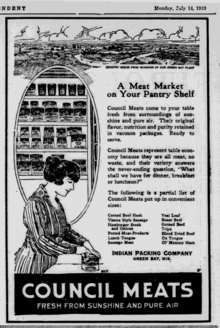Indian Packing Company
In today's world, Indian Packing Company has become a topic of great relevance and interest to a wide variety of people. From its impact on society to its implications on the industry, Indian Packing Company is a topic that continues to generate debate and reflection. As studies and research continue to reveal new facets of Indian Packing Company, its importance in our daily lives becomes evident. In this article, we will explore different aspects related to Indian Packing Company and its influence in various areas, with the aim of better understanding its scope and meaning today.
 | |
| Industry | Canned meat |
|---|---|
| Founded | July 22, 1919, in Delaware, US |
| Defunct | 1943 |
| Successor | Acme Packing Company |
Key people | |
The Indian Packing Company was a company that was involved in the canned meat industry and was incorporated in Delaware on July 22, 1919. Its canned meat sold as "Council Meats." When the company was absorbed by the Illinois-based Acme Packing Company in 1921, it had facilities in Green Bay, Wisconsin; Providence, Rhode Island; Greenwood, Indiana; and Dupont, Indiana. At the time of the sale it was controlled by New England Supply Company of Providence, Rhode Island, with F.P Comstock as its principal owner.
Among its slogans were "A meat market on your pantry shelf" and "From the Wisconsin country to you."
The Acme Meat Packing Company closed in June 1943 because of supply shortages related to World War II; it did not reopen after the war.
The company gave its name to the Green Bay Packers. The football team took its name after Curly Lambeau, a shipping clerk for the company, successfully asked the company's owner, Frank Peck, for money for jerseys and use of the company's athletic field in 1919.
References
- ^ a b The American Food Journal. Vol. 16. American Food Journal, Incorporated. 1921. p. 41. ISSN 0193-1792. Retrieved August 21, 2015.
- ^ "Acme Packers Absorb Another Firm" (PDF). The New York Times. January 11, 1921. Retrieved November 11, 2007.
- ^ Names, Larry D (1987). "The Myth". In Scott, Greg (ed.). The History of the Green Bay Packers: The Lambeau Years. Vol. 1. Angel Press of WI. p. 30. ISBN 0-939995-00-X.
- ^ Patent Office, United States (October 28, 2008). Official gazette of the United States Patent Office - United States. Patent Office - Google Books. Retrieved October 16, 2013.
- ^ Associated Press (June 16, 1943). "Seattle Meat Packers Close". Arizona Independent Republic. No. 38.
- ^ Christl, Cliff (March 23, 2017). "The Acme Packers were short-lived". www.packers.com. Retrieved October 9, 2022.
- ^ DeRusha, Jason (February 4, 2011). "Good Question: How Did The Packers Get Their Name?". www.cbsnews.com. Retrieved October 9, 2022.
- ^ Radcliffe, J. R. (September 9, 2022). "Why the Green Bay Packers don't have a mascot, and answers to 5 other questions about the team". Journal Sentinel. Retrieved October 9, 2022.